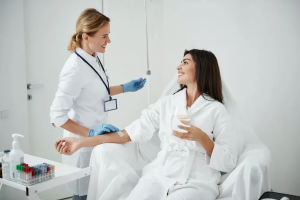Hemorrhoids—a topic that many find uncomfortable to discuss, yet it's a condition that affects millions of Americans each year. The National Institute of Diabetes and Digestive and Kidney Diseases (NIDDK) reveals that the condition impacts about 1 in 20 Americans. Moreover, nearly half of adults over age 50 suffer from it.
Yet, despite their prevalence, many myths about hemorrhoids persist, making it difficult for people to seek the right care. This misinformation can delay treatment or push people toward invasive solutions they don't need. The good news? You can opt for a non-surgical hemorrhoid treatment that offers effective relief.
Let's break down five myths about hemorrhoids that you should stop believing.
Myth 1: Hemorrhoids Are Caused by Spicy Foods
It's a popular belief that eating spicy foods causes hemorrhoids or worsens their symptoms. While spicy food might cause stomach discomfort, it doesn't lead to hemorrhoids. The real culprit behind hemorrhoids is pressure, typically due to straining during bowel movements, constipation, or prolonged sitting in the washroom.
Hemorrhoids form when blood vessels in the rectal area swell from this pressure. Moreover, HealthMatch explains that certain foods can affect bowel movements and potentially worsen symptoms. For instance:
- Spicy foods may irritate the digestive system, leading to diarrhea or discomfort
- Low-fiber diets can cause constipation, increasing strain during bowel movements
- Excessive caffeine or alcohol can contribute to dehydration, potentially leading to harder stools
Birmingham Gastroenterology confirms that spicy foods don't directly worsen hemorrhoid symptoms. While you might feel irritation after eating something spicy, rest assured it's not causing or exacerbating hemorrhoids.
Myth 2: Only Older People Get Hemorrhoids
While hemorrhoids may be more common in older adults, they can occur at any age. Hemorrhoids are often associated with aging due to the weakening of tissues supporting the rectal veins.
However, they also impact younger people, especially those who sit for long periods and experience chronic constipation or strain during bowel movements. Additionally, pregnant women are highly susceptible to hemorrhoids due to the increased pressure on the abdomen and pelvic region during pregnancy. About 30% to 40% of pregnant women develop hemorrhoids due to increased pressure in the lower body and hormonal changes that impact blood vessels.
According to the Cleveland Clinic, it usually occurs in the third trimester and the first-month post-delivery. Other risk factors include:
- Chronic constipation
- Heavy lifting
- Family history
- Obesity
The fact is that anyone can develop hemorrhoids, whether young or old, particularly if they engage in activities that strain the rectal area.
Myth 3: Hemorrhoids Always Require Surgery
The fear of surgery prevents people from seeking treatment. Many believe that hemorrhoids can only be treated through invasive procedures, but this isn't true. Ernest Castro, M.D. reveals surgery is advised for extreme events where other therapies have failed. For most people, hemorrhoids can be managed or even eliminated through non-invasive methods.
Procedures like rubber band ligation, sclerotherapy, infrared coagulation (IRC), heat energy therapy (HET), and over-the-counter creams are highly effective for treating internal hemorrhoids. These options are painless, quick, and often performed in outpatient settings. Simple dietary changes, like upping your fiber consumption and being hydrated, can prevent flare-ups and offer relief.
Myth 4: Hemorrhoids Increase the Risk of Cancer
This is perhaps the most alarming myth, but it's important to understand that hemorrhoids themselves don't increase your risk of cancer. Bleeding during bowel movements is a common symptom of hemorrhoids, but don't confuse this with more serious conditions like colorectal cancer.
While both hemorrhoids and cancer can cause rectal bleeding, hemorrhoids themselves do not increase your cancer risk. However, because the symptoms overlap, it's critical to get any unusual bleeding checked by a healthcare professional to rule out other causes. Ignoring hemorrhoid symptoms and attributing them solely to hemorrhoids without medical consultation can lead to missed diagnoses of more serious conditions.
It's always better to get a doctor's confirmation to ensure that any bleeding is accurately diagnosed.
Myth 5: Hemorrhoids Are Permanent
One of the most persistent myths is that once you have hemorrhoids, they are permanent. This isn't true. Hemorrhoids can be treated and managed effectively, with many patients experiencing significant improvement after simple treatments. Most hemorrhoids resolve on their own, especially with the help of home remedies like increased fiber intake, warm baths, and over-the-counter medications.
In cases where home treatments don't work, non-surgical procedures such as rubber band ligation can provide lasting relief without requiring more invasive interventions. While hemorrhoids can return, maintaining a healthy diet and avoiding prolonged sitting can significantly reduce the chances of recurrence.
Commonly Asked Questions
Q1. How long do hemorrhoids typically last?
Hemorrhoids may persist for a few days or a couple of weeks. With proper care and treatment, many cases improve within a week. However, chronic hemorrhoids may persist longer. Everyone's healing time is different, so don't worry if yours takes longer to resolve.
Q2. Can exercise help prevent hemorrhoids?
Yes. Regular physical activity can help avoid hemorrhoids by increasing blood flow and relieving bloating. Practices like walking, swimming, or yoga can be immensely beneficial. However, remember to drink enough fluids and listen to your body. Don't overdo it, especially if you're already experiencing discomfort.
Q3. Are there any natural remedies for hemorrhoid relief?
Various natural remedies can offer comfort against hemorrhoid symptoms. Witch hazel, aloe vera, and sitz baths with Epsom salts are popular. Some people find that applying cold or warm compresses helps. As with any treatment, it's best to consult your doctor first.
Hemorrhoids are a common but manageable condition. Unfortunately, the myths surrounding them often make treatment seem more daunting than it needs to be. Understanding the truth behind these common hemorrhoid myths is crucial for proper care and peace of mind.
Whether you believe spicy foods cause hemorrhoids or that surgery is the only option, it's time to rethink these misconceptions. Thanks to the advances in hemorrhoid treatments, relief is easier and more accessible than ever. Don't let myths stand in the way of proper care. If you're experiencing persistent symptoms, consult a healthcare professional to get the facts and decide on the best personalized treatment.






